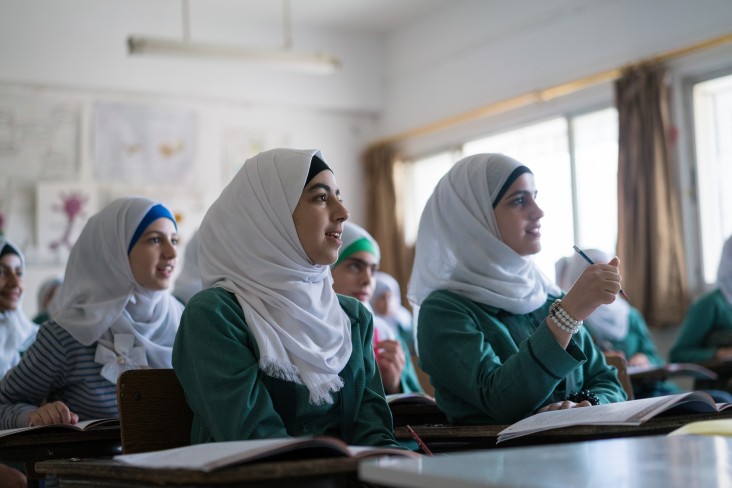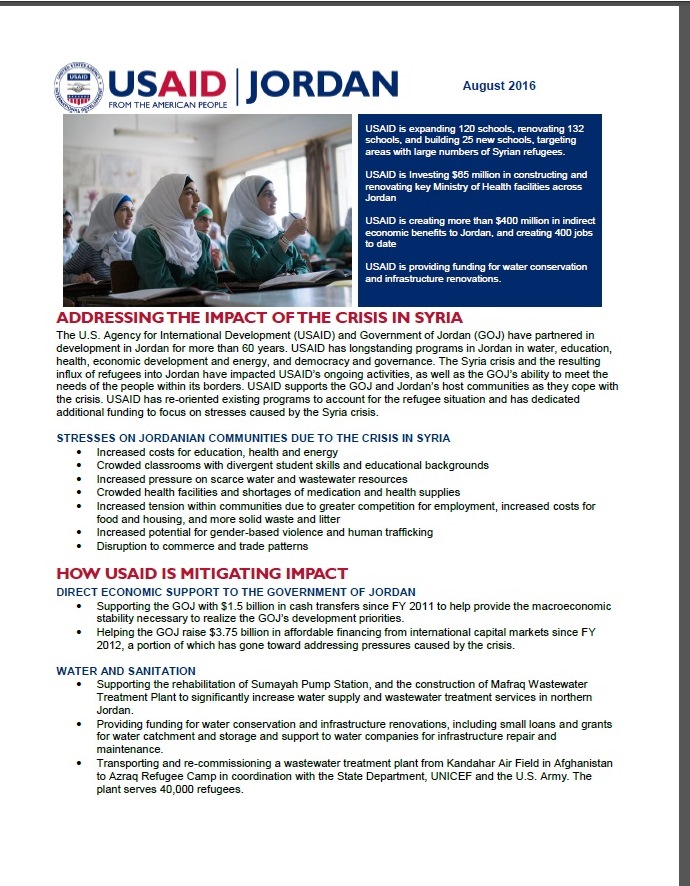Speeches Shim
OVERVIEW
The U.S. Agency for International Development (USAID) and Government of Jordan (GOJ) have partnered in development in Jordan for more than 60 years. USAID has longstanding programs in Jordan in water, education, health, economic

development and energy, and democracy and governance. The Syria crisis and the resulting influx of refugees into Jordan have impacted USAID’s ongoing activities, as well as the GOJ’s ability to meet the needs of the people within its borders. USAID supports the GOJ and Jordan’s host communities as they cope with the crisis. USAID has re-oriented existing programs to account for the refugee situation and has dedicated additional funding to focus on stresses caused by the Syria crisis.
STRESSES ON JORDANIAN COMMUNITIES
- Increased costs for education, health and energy
- Crowded classrooms with divergent student skills and educational backgrounds
- Increased pressure on scarce water and wastewater resources
- Crowded health facilities and shortages of medication and health supplies
- Increased tension within communities due to greater competition for employment, increased costs for food and housing, and more solid waste and litter
- Increased potential for gender-based violence and human trafficking
- Disruption to commerce and trade patterns
HOW USAID IS MITIGATING THE IMPACT
Syria Crisis Response fact sheet ![]() (pdf - 313k)
(pdf - 313k)
DIRECT ECONOMIC SUPPORT TO THE GOVERMENT OF JORDAN
-
Supporting the GOJ with $1.5 billion in cash transfers since FY 2011 to help provide the macroeconomic stability necessary to realize the GOJ’s development priorities.
-
Helping the GOJ raise $3.75 billion in affordable financing from international capital markets since FY 2012, a portion of which has gone toward addressing pressures caused by the crisis.
WATER AND SANITATION
- Supporting the rehabilitation of Sumayah Pump Station, and the construction of Mafraq Wastewater Treatment Plant to significantly increase water supply and wastewater treatment services in northern Jordan.
- Providing funding for water conservation and infrastructure renovations, including small loans and grants for water catchment and storage and support to water companies for infrastructure repair and maintenance.
- Transporting and re-commissioning a wastewater treatment plant from Kandahar Air Field in Afghanistan to Azraq Refugee Camp in coordination with the State Department, UNICEF and the U.S. Army. The plant serves 40,000 refugees.
HEALTH
- Investing $65 million in constructing and renovating key Ministry of Health facilities across Jordan, increasing the GOJ’s ability to provide essential health services to Jordanians and Syrian refugees. This includes the ongoing expansion to Princess Rahma Pediatric Hospital – northern Jordan’s only pediatric referral hospital – to improve health services for host communities and increase capacity by 35 percent. In addition, USAID is expanding the Emergency Department of Al Bashir Hospital in Amman, the largest public hospital in Jordan, which serves 50,000 emergency patients per month.
- Providing $81 million to ensure the GOJ continues to deliver quality maternal and child health care and family planning services to communities under pressure from Syrian refugees.
- Directing $51 million to strengthen the resiliency of Jordan’s health system, including health financing, governance, human resources management, and disease surveillance.
EDUCATION AND YOUTH
- Expanding 120 new schools (20 of which are accelerated “fast track” expansions), renovating 132 schools, and building 25 new schools, targeting areas with large numbers of Syrian refugees.
- Providing UNICEF with $12 million to support their work in refugee host communities with early childhood education, reading campaigns, and youth empowerment.
- Funding non-formal education for 2,000 Jordanians and Syrians who have dropped out or have not been able to enter the public school system.
- Working with the Ministry of Education and other international donors to ensure access to public school in the 2016-2017 school year for every child in Jordan, including Syrian refugees.
DEMOCRACY AND GOVERNANCE
- Partnering with host communities, municipalities, and other stakeholders to promote community cohesion and resilience through community initiatives, improved service delivery, and conflict mitigation.
- Engaging Jordanians and Syrians in participatory decision-making, using discussion forums in select neighborhoods of Irbid and Mafraq on human rights, the role of media, and citizenship.
- Partnering with local organizations to support local initiatives to address community-identified issues including trafficking in persons, hate speech, early marriage, and violence in schools
ECONOMIC DEVELOPMENT
- Training provided to micro- and small enterprises to encourage economic growth and increased investment, leading to resiliency and increased stability among vulnerable populations.
- Conducting a survey to identify the economic impacts of the Syrian presence in Jordan including Syrian economic activity and potential skill sets, and their impact on Jordanian employment (including wages), investment, and inflation.
ADDITIONAL SUPPORT
- Providing Syrian refugees in Jordan with food, food vouchers, or e-vouchers in the form of a debit card, allowing them to buy provisions at local markets, benefiting both refugees and local merchants.
- Investing $258.7 million in physical infrastructure to build, expand and renovate Jordan’ schools and hospitals and update Jordan’s water system. Creating more than $400 million in indirect economic benefits to Jordan, and creating 400 jobs to date, in addition to generating $6 million in tax receipts for the GOJ as of the end of 2014 through support to the U.N. World Food Program.
- Providing physical therapy for victims of torture.


Comment
Make a general inquiry or suggest an improvement.